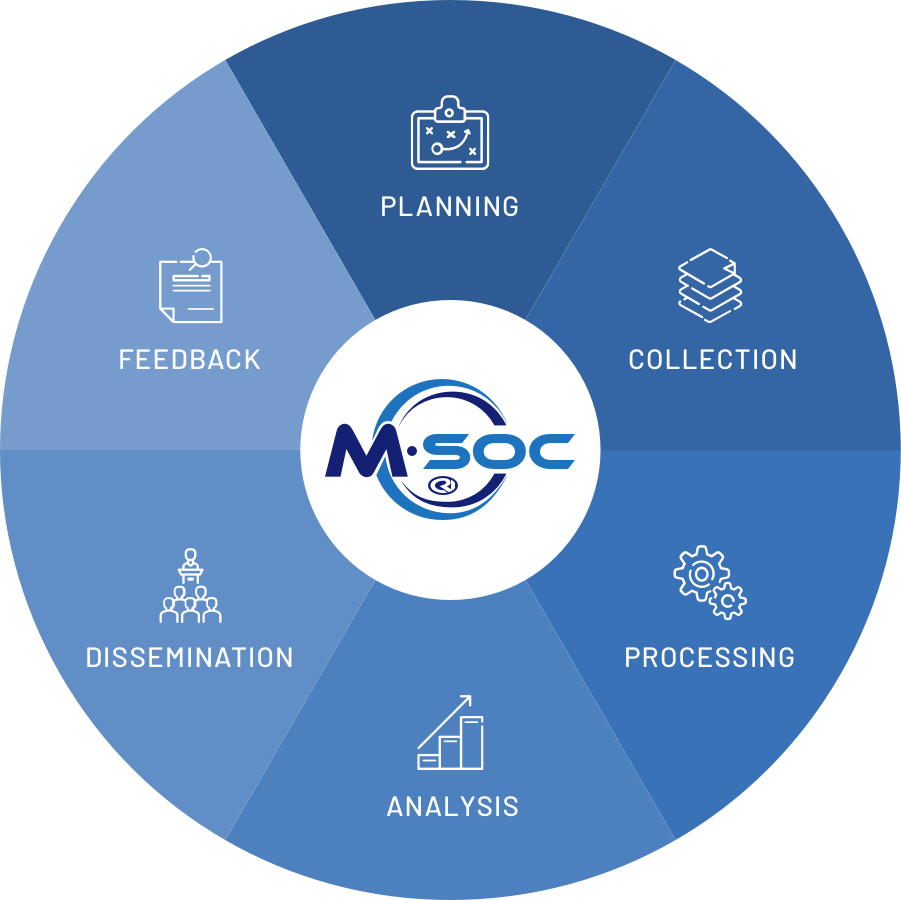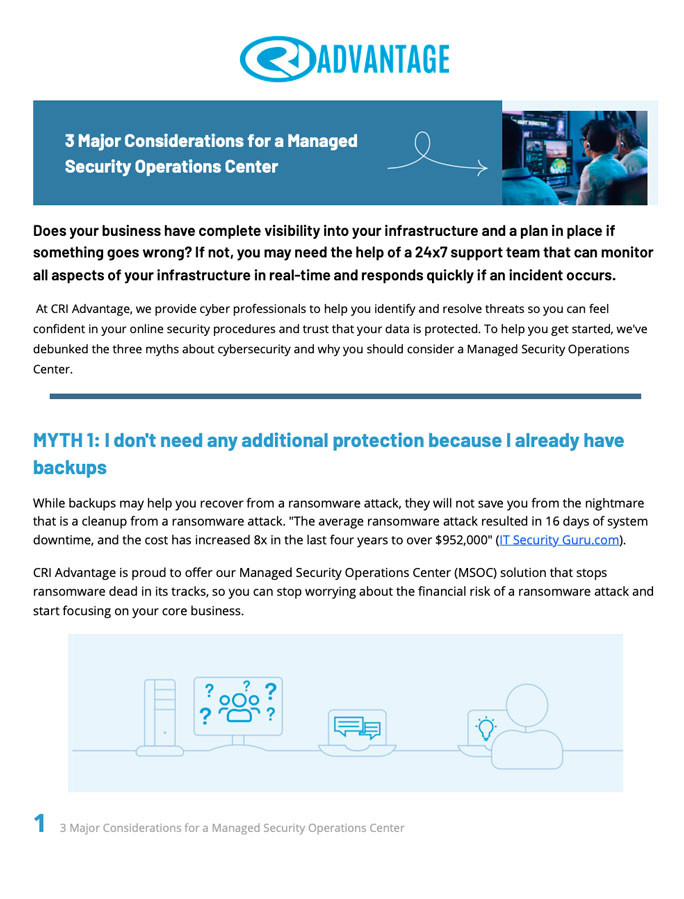mSOC: 24x7 Threat Monitoring
Managed Security Operations Center
Complete Managed Security for Today’s Threats
A managed security operations center, or MSOC, is a dedicated facility that is responsible for monitoring, analyzing, and responding to security incidents and threats in an organization’s network and systems. This center typically operates 24/7 and is staffed by trained security experts who are responsible for maintaining the security posture of the organization.
What can CRI's Managed Security Operations Center do for your organization?
Security Information and Event Management (SIEM)
SIEM (Security Information and Event Management) is a type of security software that aggregates and analyzes log data from various devices, endpoint agents and systems within an organization’s network. The goal of SIEM is to provide real-time visibility into potential security threats and to assist with compliance requirements. CRI’s single MSOC solution brings SIEM, Threat Intelligence and the Mitre Attack framework into your organization to great enhance the SOC’s ability to detect, deter and end attacks. We bundle all these aspects of Cybersecurity into a single turn-key package to empower your security program and reduce your company’s risk all in a single solution.Security Automation Orchestration Response (SOAR)
SOAR (Security Orchestration, Automation, and Response) is a security management approach that combines various security tools and technologies to automate and streamline incident response processes. The goal of SOAR is to improve the efficiency and effectiveness of incident response by automating repetitive tasks, reducing the time to respond to incidents, and providing a unified view of the security of an organization’s network.Intrusion Detection/Data Leakage Prevention (IDS/DLP)
IDS (Intrusion Detection System) is a type of security software that monitors a network for suspicious activity and attempts to detect and alert on any potential security breaches. IDS systems work by analyzing network traffic, system logs, and other data sources to identify patterns of behavior that indicate a possible intrusion. DLP (Data Loss Prevention) is a security strategy that aims to prevent sensitive or confidential data from being accidentally or maliciously leaked outside of an organization. DLP solutions typically include software that can be installed on servers, workstations, or other devices to monitor and control the flow of data. DLP software can monitor data in transit (when it’s being sent or received) or data at rest (when it’s stored on a device).Endpoint Detection Response
Endpoint detection and response (EDR) is a type of security software that is designed to detect and respond to malicious activity on a network. It is typically installed on individual devices or endpoints, such as computers, servers, and mobile devices, and monitors network traffic and activity for signs of suspicious or malicious behavior. EDR solutions can include features such as real-time monitoring, threat intelligence, and incident response capabilities, and are often used in conjunction with other security technologies, such as antivirus software and firewalls.
View the video
Governance, Risk, and Compliance (GRC)
Governance, Risk, and Compliance (GRC) is a term that refers to the integrated management of an organization’s governance, enterprise risk management, and compliance with regulatory requirements. GRC solutions are designed to help organizations manage these three areas holistically, by providing tools for identifying and assessing risks, monitoring compliance, and automating the implementation of governance processes and policies. This can help organizations improve their overall risk management and compliance posture, and minimize the likelihood of costly regulatory fines or reputational damage.24×7 Incident Response
A 24×7 incident response service typically includes a team of security experts who monitor an organization’s networks and systems for signs of suspicious or malicious activity and respond to incidents as soon as they are detected. This can include things like analyzing network traffic, reviewing logs, and identifying the cause of an incident. CRI’s MSOC solution provides all this as one easy solution that provides incident response planning and procedures, incident handling, containment and eradication, forensic investigation, and post-incident recovery and reporting. All incidents have a root cause analysis done to ensure that the source of the incident is determined and mitigated.Vulnerability Scanning
Cybersecurity vulnerability scanning is the process of identifying vulnerabilities in an organization’s networks, systems, and applications. Vulnerability scanning is typically performed by automated tools, which can scan an organization’s networks and systems for known vulnerabilities, such as missing security patches, weak passwords, and misconfigured systems.
Vulnerability scanning is an important aspect of an organization’s overall security strategy, as it helps organizations identify and address vulnerabilities before they can be exploited by attackers. Regular vulnerability scanning can also help organizations maintain compliance with industry standards and regulations, such as PCI DSS, HIPAA, FTC and others.
Available as a standalone service. Learn More…
Ticketing, Service desk and ITSM
Ticketing, Service Desk, and ITSM are all closely related and often used together to manage and deliver IT services within an organization. A good ticketing system and Service Desk team, working with well-defined ITSM processes, can help organizations deliver high-quality IT services that meet the needs of the business, while also ensuring compliance with industry standards and regulations.
CRI’s ServiceNow division can help your company organize it ticketing and meet the requirements of ITSM to enhance your IT delivery to your end users.
The CRI Advantage
A managed security operation center plays a crucial role in maintaining the security posture of an organization. By continuously monitoring and responding to potential threats, the MSOC team is able to ensure that the organization’s network and systems are secure and that any security incidents are addressed quickly and effectively.
Threat Intelligence
Human Analysis
Human analysis offers a valuable complement to technology in the fight against cyber threats, Giving us increased ability to detect complex threats, respond to evolving threats, bringing expertise to bear in strategic and tactical decision making, and perhaps most important of all, understanding context.
Security as a Service
Cybersecurity as a Service (CaaS) brings more horsepower to bear than most smaller organizations can afford on their own. In addition to broad cost savings, CaaS gives you access to expertise, cutting edge technology, andscalable platforms to improve your risk position and bring you peace of mind.
Our Integrated Approach
In addition to responding to security incidents, the MSOC team is also responsible for implementing security controls and policies to prevent future threats. This may involve working closely with other teams such as the IT department to develop and implement security policies and procedures, as well as providing regular training and awareness programs to employees on how to identify and prevent potential security threats.

3 Major Considerations for a Managed Security Operations Center - Download our free guide
24×7 Monitoring: Get round-the-clock monitoring of your IT environment for any potential threats. Learn more about what MSOC can do for your business and why backups won’t protect you from ransomware.
FAQs
Need more information about Managed Security Operations Center? We’ve collected some of the cybersecurity industry’s most frequently asked questions:
A SOC is a centralized unit that is responsible for monitoring, detecting, and responding to security threats within an organization’s network. A managed SOC refers to outsourcing these security operations to a third-party service provider.
An in-house SOC is operated by a company’s own internal IT security team, while a managed SOC is outsourced to a third-party provider. A managed SOC provides access to a larger pool of resources and expertise, and may offer more cost-effective solutions compared to building an in-house team.
We provide 24/7 monitoring and analysis of security events, threat intelligence, incident response, vulnerability management, and compliance reporting.
Benefits include reduced operational costs, access to a team of experienced security professionals, and improved security posture through ongoing threat monitoring and response.
CRI’s MSOC uses a combination of tools and processes, such as intrusion detection systems data, firewall data, security information and event management (SIEM) solutions, and threat intelligence feeds to identify and respond to potential security threats.
CRI’s IR Team follows a well-defined incident response plan to quickly contain, eradicate, and recover from security incidents. Our incident response team works closely with the customer to ensure timely resolution and minimal disruption to business operations.
Get your guide to MSOC
We debunk the myths surrounding corporate security and share insights to consider when determining if an MSOC would be beneficial to your organization.




